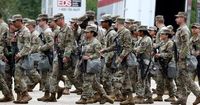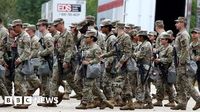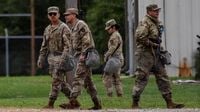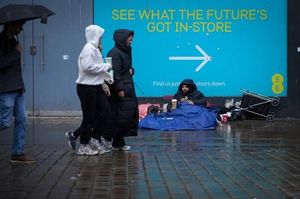Hundreds of National Guard troops from Texas touched down outside Chicago this week, marking a dramatic escalation in President Donald Trump’s ongoing clash with local leaders over immigration enforcement and federal authority. The move, which has stirred deep controversy and legal challenges, comes as protests against U.S. Immigration and Customs Enforcement (ICE) intensify in the city, and as Trump publicly called for Chicago’s mayor and Illinois’ governor to be jailed for what he described as a failure to protect federal agents.
According to ABC7 Chicago, nearly 500 National Guard troops—about 200 from Texas and 300 from Illinois—were activated under Title 10 orders for a 60-day mission to protect ICE and other federal personnel in the Chicago area. The Texas contingent began arriving at an Army Reserve training center in Elwood, roughly 50 miles southwest of the city, as early as Monday night. By Wednesday, extra fencing and tarps concealed the site, and temporary trailers served as living quarters for the guardsmen, CBS News reported.
The deployment, which local officials say was ordered with little communication or transparency, has sparked a fierce backlash from Illinois Governor JB Pritzker and Chicago Mayor Brandon Johnson, both Democrats. Pritzker, speaking at a government shutdown rally on Wednesday, did not mince words: “This is someone that is so insecure that he lashes out, pretending that he can come arrest people for no reason at all. He can't. He isn't gonna do it. TACO. Trump always chickens out.” The governor’s office, according to ABC7 Chicago, was left “in the dark” about the federalization of Illinois troops.
Mayor Johnson was equally blunt, declaring, “Donald Trump declared war on Chicago. That's what he did. What the Trump administration is doing is intentionally fomenting chaos. The federal government is out of control. This is one of the most dangerous times in our nation's history,” as quoted by ABC News and the BBC. Johnson also stated on social media, “This is not the first time Trump has tried to have a Black man unjustly arrested. I'm not going anywhere.”
Trump, for his part, doubled down on his criticism of Chicago’s leadership. On Wednesday, he posted on Truth Social, “Chicago Mayor should be in jail for failing to protect ICE Officers! Governor Pritzker also!” The former president has repeatedly argued that the use of National Guard troops is necessary to curb violence in Democratic-controlled cities and to support his administration’s crackdown on undocumented immigration. “If the governor can't do the job, we'll do the job,” Trump said from the Oval Office on Tuesday, according to the BBC.
Governor Greg Abbott of Texas defended the deployment, stating on social media, “I fully authorized the President to call up 400 members of the Texas National Guard to ensure safety for federal officials.” But Pritzker and Johnson, backed by advocacy groups such as the Illinois Coalition for Immigrant and Refugee Rights, have vowed resistance. “Illinois will not let the Trump administration continue on their authoritarian march without resisting,” Pritzker declared, promising to “use every lever at our disposal to stop this power grab because military troops should not be used against American communities.”
The legal battle has already begun. The state of Illinois and the City of Chicago filed a lawsuit on Monday seeking to block the deployment of military troops, arguing that “the American people, regardless of where they reside, should not live under the threat of occupation by the United States military, particularly not simply because their city or state leadership has fallen out of a president's favor.” A federal judge has allowed the Chicago deployment for now, but a hearing is set for Thursday to determine its legality. The lawsuit contends that the foundational principle separating the military from domestic affairs is “in peril” as Trump seeks to federalize National Guard units across the country.
National Guard troops, under current law, have limited authority in domestic affairs. As the BBC explains, they do not enforce laws, conduct arrests, or perform searches; their role is restricted to protecting federal officers and property. The nearly 150-year-old Posse Comitatus Act prohibits the military from engaging in domestic law enforcement, but Trump has threatened to invoke the Insurrection Act of 1807 if federal courts block his deployments. That law grants the president sweeping powers to use active-duty military personnel to suppress insurrections or enforce federal law when state authorities are unable or unwilling to do so.
Chicago is not alone in facing this federal intervention. Trump has already sent National Guard units into Los Angeles and Washington, D.C., and ordered them to enter Memphis and Portland. In Portland, a federal judge temporarily barred the deployment, while in Memphis, the Guard could arrive by Friday, according to the Associated Press. Republican leaders in some states, such as Tennessee Governor Bill Lee, have welcomed the assistance, seeing it as a way to bolster local police forces.
The timing of the Chicago deployment is particularly fraught. Over the past weekend, U.S. Border Patrol personnel shot and injured a woman after a group rammed cars into immigration enforcement vehicles outside a Chicago ICE facility, events that have heightened tensions and drawn more demonstrators. Organizations like the Illinois Coalition for Immigrant and Refugee Rights planned protests in downtown Chicago on Wednesday evening, undeterred by the military presence.
Despite Trump’s repeated claims that Chicago is beset by out-of-control crime, data analyzed by ABC7 Chicago paint a different picture: the city recorded 458 murders in the past 12 months, nearly a 30% decrease from the prior three-year average. Still, the president has branded Chicago a “war zone” and used the unrest to justify his actions.
For many Chicagoans—and for city and state officials—the deployment raises profound questions about the balance of power between local and federal government, the role of the military in American life, and the future of protest and dissent. As Johnson told the BBC, “Literally handpicking National Guard people from another state, the state of Texas, and then sending them to the state of Illinois—this is illegal, unconstitutional, and dangerous.”
With a court hearing looming and protests mounting, the coming days will test not just the legal limits of federal power, but the resilience of democratic norms in one of America’s largest cities. As the legal and political battles play out, the eyes of the nation remain fixed on Chicago, where the fight over immigration enforcement, local autonomy, and presidential authority has reached a boiling point.






